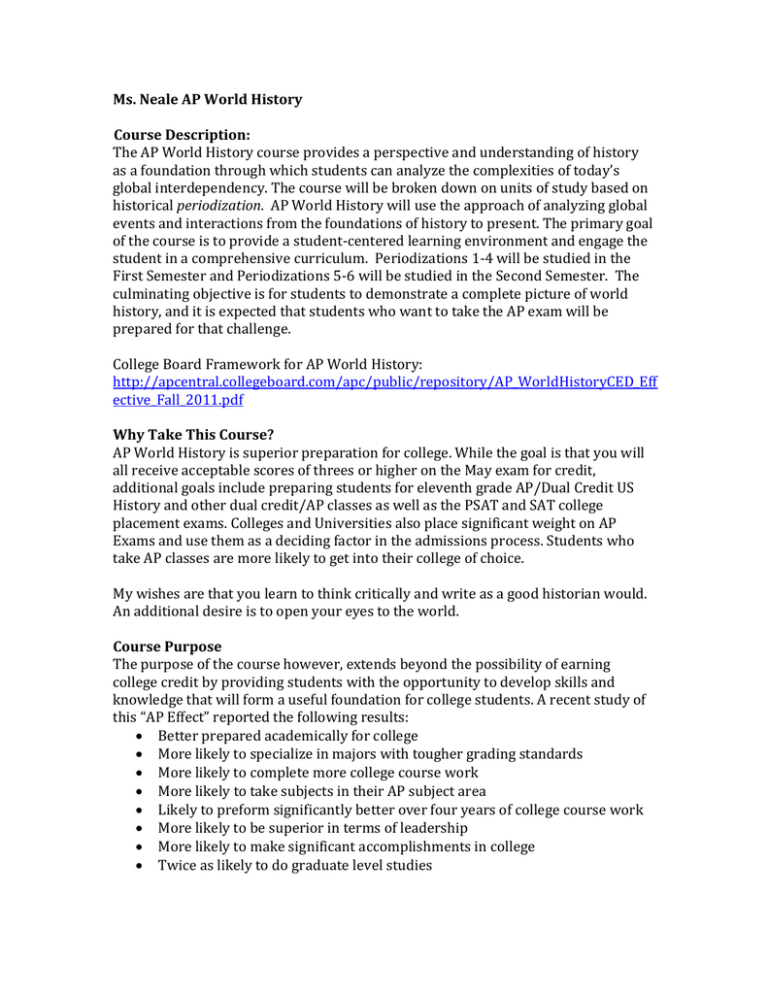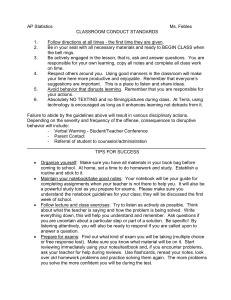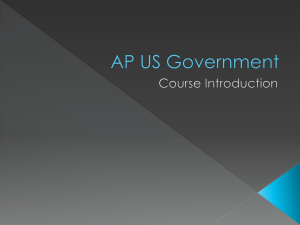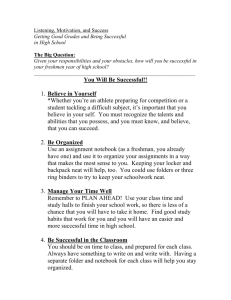The Five Themes of AP World History
advertisement

Ms. Neale AP World History Course Description: The AP World History course provides a perspective and understanding of history as a foundation through which students can analyze the complexities of today’s global interdependency. The course will be broken down on units of study based on historical periodization. AP World History will use the approach of analyzing global events and interactions from the foundations of history to present. The primary goal of the course is to provide a student-centered learning environment and engage the student in a comprehensive curriculum. Periodizations 1-4 will be studied in the First Semester and Periodizations 5-6 will be studied in the Second Semester. The culminating objective is for students to demonstrate a complete picture of world history, and it is expected that students who want to take the AP exam will be prepared for that challenge. College Board Framework for AP World History: http://apcentral.collegeboard.com/apc/public/repository/AP_WorldHistoryCED_Eff ective_Fall_2011.pdf Why Take This Course? AP World History is superior preparation for college. While the goal is that you will all receive acceptable scores of threes or higher on the May exam for credit, additional goals include preparing students for eleventh grade AP/Dual Credit US History and other dual credit/AP classes as well as the PSAT and SAT college placement exams. Colleges and Universities also place significant weight on AP Exams and use them as a deciding factor in the admissions process. Students who take AP classes are more likely to get into their college of choice. My wishes are that you learn to think critically and write as a good historian would. An additional desire is to open your eyes to the world. Course Purpose The purpose of the course however, extends beyond the possibility of earning college credit by providing students with the opportunity to develop skills and knowledge that will form a useful foundation for college students. A recent study of this “AP Effect” reported the following results: Better prepared academically for college More likely to specialize in majors with tougher grading standards More likely to complete more college course work More likely to take subjects in their AP subject area Likely to preform significantly better over four years of college course work More likely to be superior in terms of leadership More likely to make significant accomplishments in college Twice as likely to do graduate level studies The Five Themes of AP World History Students in this course must learn to view history thematically. The AP World History course is organized around five overarching themes that serve as unifying threads throughout the course, helping students to relate what is particular about each time period or society to a “big picture” of history. The themes also provide a way to organize comparisons and analyze change and continuity over time. Consequently, virtually all study of history in this class will be tied back to these themes by utilizing a “SPICE” acronym. Social-Development and transformation of social structures Gender roles and relations Family and kinship Racial and ethnic constructions Social and economic classes Political- State building, expansion and conflict Political structures and forms of governance Empires Nations and nationalism Revolts and revolutions Regional, transregional, and global structures and organizations Interaction between humans and the environment Demography and disease Migration Patterns of settlement Technology Cultural- Development and interaction of cultures Religions Belief systems, philosophies and ideologies Science and technology The arts and architecture Economic- Creation, expansion and interaction of economic systems Agricultural and pastoral production Trade and commerce Labor systems Industrialization Capitalism and socialism Habits of Mind: Constructing and evaluating arguments: using evidence to make plausible arguments Using documents and other primary data: developing the skills necessary to analyze point of view, context, and bias, and to understand and interpret information Assessing issues of change and continuity over time, including the capacity to deal with change as a process and with questions of causation Understanding diversity of interpretations through analysis of context, point of view, and frame of reference. Seeing global patterns and processes over time and space while also connecting local developments to global ones and moving through levels of generalizations from the global to the particular Comparing within and among societies, including comparing societies reactions to global processes Being aware of human commonalities and differences while assessing claims of universal standards, and understanding culturally diverse ideas. Required Materials: Blue or Black Pen Spiral Notebook – 200+pages Set of highlighters Expectations: 1. BE ON TIME and ready to work. 2. Follow directions the first time they’re given. 3. Stat on task and focused; ignore distractions. 4. Always give your best effort in order to actively participate. 5. Respect Ms. Neale, yourself, others, and your environment. Consequences: 1. Verbal Warning 2. Student-Teacher Conference 3. Parent Contact – phone call home 4. Parent-Teacher Conference 5. Administrator involvement Grading Breakdown: 25% 25% Tests Projects/Essays/Interactive Notebooks 20% 20% 10% Quizzes Classwork Homework Homework Policy: Students who properly manage their time should expect to have one-hour of homework 3-4 times per week. It is imperative that you manage your time wisely, this is a fast paced course and it is very easy to fall behind. Late Policy: Late work may be accepted with a deduction, up to 5 consecutive days past the due date. After the first day late, the assignment will receive a 10pt deduction and 5pts for every day proceeding it. After 4pm on the 5th day, it will be a 0. A parent/ guardian may contact the teacher if there are circumstances in which a student may need further extended time. Should time be allotted, the student will have another 5 days to complete the assignment and can only receive up to a 70. The assignment must be submitted by 4pm on the 5th day, if not sooner. Absolutely no late work will be accepted beyond 4pm on the last Friday of each grading cycle: Cycle 1: September 25th Cycle 2: October 30th Cycle 3: December 11th Cycle 4: February 5th Cycle 5: March 25th Cycle 6: May 13th Absence Policy: If you are absent at any given time during the school year it is your responsibility to come to me and ask for make-up work. (It is not my job to track you down!) Students will be allowed to make-up missed major assignments, including, but not limited to, exams and writing assignments, however the format/material will be altered. (i.e. multiple choice exams become short answer exams, alternate prompts for writing assignments) Academic dishonesty: in any form is unacceptable. This includes, but is not limited to, copying any kind of work from another student or sharing answers with another student (collusion), plagiarism, or using any form of aid (a.k.a. cheat sheet) on a test or quiz. The testing environment is less than stellar in the classroom and the challenges and temptations are many. Nevertheless, cheating in school has become far too acceptable among many students and needs to be eliminated. If, for any reason, a student is perceived as cheating, especially during a test, the following actions will be taken (per HISD district policy): The assignment, quiz or test will be confiscated and will be given a grade of zero. The student(s) will be asked to remain after class. The student(s) will call a parent to report the incident. The principal will be notified and a referral will be written and submitted for the record. Cellphone Policy: Students are to keep cellphones/electronic devices in backpacks and/or purses at ALL TIMES. Students may NOT have their devices on their desk at any time unless specifically instructed by the teacher. Any cellphone that is out during class time will be confiscated and turned in to the office. NO EXCEPTIONS! **Quiz/Test day policy – On days that students are taking a quiz or test students will turn their phones in to the cell phone holder at the front of the classroom. Students will put their phone in a specific numbered pocket and remove the corresponding laminated number. Upon completing their quiz/test they may retrieve their phone and replace the number in the corresponding pocket. Computers: The school provided laptops will be heavily utilized in this classroom. Students are expected to stay on task and not wander the Internet. Students who fail to stay on task will not be allowed to use their computer in class. Notes: Notes are an essential part to being successful in this class. Notes will be kept in an interactive spiral notebook. All notes must be handwritten, unless the student has documented need for an electronic option. Numerous studies have proven time and again that students retain significantly more information when handwriting notes than using an electronic note taking method. All notes should be written in Cornell format. Interactive Notebook: The goal of the interactive notebook is to have an organized way to keep all important AP World History documents at your fingertips. Assignments will be complete on right-hand pages and Cornell notes will be taken on the left-hand pages. Students are expected to keep a running table of contents and bring the notebook to every class. The notebook will be collected every six weeks for a test grade. – We will set our notebooks up during class to ensure everyone is using the correct format. Exams: All exams will be a combination of multiple choice, identification (vocabulary), and short answer. Quizzes: Will consist of 10-15 questions that are a combination of multiple choice and identification from the chapter readings and/or flipped classroom videos. Unit Outline: Unit 1- 8000BCE-600BCE: Technological and Environmental Transformations Key Concepts: Big Geography and the Peopling of the Earth Neolithic Revolution and Early Agricultural Societies Development and Interactions of Early Agricultural, Pastoral, and Urban Societies Skills: Map Skills Jigsaws & appropriate use of graphic organizers Understanding the AP Writing Rubrics CCOT Essay Allotted Time: 2 Weeks Unit 2- 600BCE-600CE: Organization and Reorganization of Human Societies Key Concepts: Development and Codification of Religious and Cultural Traditions Development of States and Empires Emergence of Transregional Networks of Communication and Exchange Skills: Writing a Comparison Essay Writing a Change and Continuity Over Time Essay (CCOT) Students will evaluate multiple empires using Jigsaw method & graphic organizers Students will work with the Harkness Model Students will work on Group Presentations Allotted Time: 4 Weeks Unit 3- 600-1450: Regional and Transregional Interactions & Basics of the DBQ Key Concepts: Expansion and intensification of Communication and Exchange Networks Continuity and innovation of States Forms and Their Interactions Increased Economic Productive Capacity and Its Consequences Skills: Writing a comparison essay (2) Writing a CCOT (1) Harkness Model based discussions Class Debates Understanding the components of the DBQ Evaluating periodization Map skills – Migrations and spread of empires Allotted Time: 4 1/2 weeks Unit 4 (part 1- before winter break) – 1450-1750: Global Interactions Key Concepts: Globalizing Networks of Communication and Exchange New Forms of Social Organization and Modes of Production State Consolidation and Imperial Expansion Skills: Understanding the DBQ Essay Looking at Primary Source Documents Evaluate the causes and consequences of European maritime expansion (Harkness Discussion) Allotted Time: 2 week



